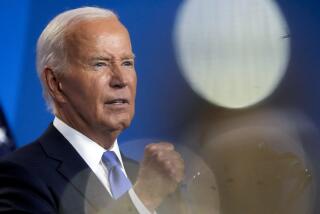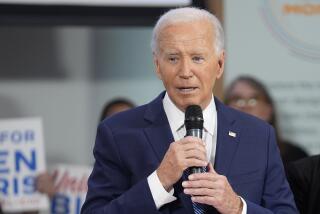Down for the Count? : This election could still be a contender : Putting Oomph in the Campaign
- Share via
WASHINGTON — Is the 1992 presidential race over? That’s what it looks like. President Bush is rocking along with a 70% approval rating. The Democrats can’t come up with a first-string player to run against him. The news media are planning to cut back their election coverage--and, not coincidentally, their costs. After all, if the country has an election but no one watches it on television, you can’t say it happened.
But those who write off 1992 as a non-story are forgetting something. Politics is fickle. Things change. Fast.
“A week is a long time in politics,” former British Prime Minister Harold Wilson used to say. If that is so, then 14 months is an eternity. In fact, it is twice as long as Iraq’s occupation of Kuwait, the event that changed the odds for 1992.
The 1992 contest could be interesting--even exciting? Here’s a list of things that could blow the election wide open.
Gov. Mario M. Cuomo of New York could run. That would do it in one stroke. Cuomo is the only Democrat who has both a national reputation and executive experience. He also has a rare quality for a Democrat these days. He is not a sap. He’s Italian-American, and that means he’s a tough guy. Nobody pushes Mario around.
Recently, Gov. Bill Clinton of Arkansas was quoted as saying it was a mistake for Democrats to hold their convention in New York next year. When asked to respond, Cuomo shot back, “If you make me answer his quotes, he’s a dead man.” No Democrat has talked like that since Frank Sinatra became a Republican.
That’s not to say Cuomo would beat Bush. Cuomo has no foreign-policy experience. His state has serious fiscal problems. His popularity has slipped sharply. And the only New York miracle is that anybody still lives there.
Nonetheless, Cuomo could make the 1992 race interesting, exciting and unpredictable. Why? Because Cuomo is interesting, exciting and unpredictable. After all, Democrats have spent the last six years trying to predict whether or not he would run for President.
Another scenario: George Bush could develop a health problem. Which means Dan Quayle would instantly become an issue. Earlier this year, after it was revealed that Bush had Graves’ disease, an enterprising reporter at Fox Television News asked a professional actuary to calculate Bush’s chances of survival through a second term, given what we know about his age, health and job. The answer: 87.6%. That means there is one chance in eight that Bush will not survive through 1996. How about that for a Democratic issue? “Vote for Bush, and there’s one chance in eight that you will be voting to make Quayle President. Is that a chance you want to take?”
Probably the biggest threat to Bush’s reelection is the Supreme Court. Sometime between January and July of 1992, the court is likely to decide whether to uphold or strike down its 1973 Roe vs. Wade decision protecting abortion rights. Whichever way the court decides, it could transform the 1992 campaign.
If the court overturns Roe, a massive protest will erupt--and it will be strongest among young, well-educated, suburban voters. The GOP has made big gains among those voters in recent years. They like Republican economics. But they hate right-wing religion. They are not going to give up abortion rights without a fight.
A court decision to uphold Roe could also mean trouble. This summer’s street protests in Wichita, Kan., signal a new militancy on the part of anti-abortion forces. Their message is that the status quo cannot continue as long as 1.6 million legal abortions are performed in this country every year.
Whichever way the court goes, Republicans are in trouble. They could end up with a dramatic confrontation at what would otherwise be a news-free national convention in Houston.
The economy could also hurt Bush. Right now, the recovery looks feeble. Economists are worried about a “double-dip recession,” in which a weak recovery is followed by another recession. When the economy went into recession last year, the Persian Gulf crisis saved Bush’s behind. What will Bush do if we go into another recession this year? We are running out of countries to save.
If things get bad enough, the voters are bound to take it out on Bush even if they have no confidence in the Democrats. When people get desperate, they vote for change, even if they have no idea what kind of change they are voting for. That’s how Ronald Reagan got elected in 1980.
Right now, Bush’s strong suit is foreign policy. That’s always treacherous territory, even for a President as sure-footed as Bush. Suppose something happened to Mikhail S. Gorbachev. Bush made it clear when he last visited the Soviet Union that we have cast our lot with Gorbachev. If he falls, he could take Bush with him.
The Middle East is the most treacherous territory in the world, and that is where most U.S. diplomacy is now focused. Anything could go wrong. The Middle East peace conference could fall apart. The only thing the various parties have agreed to do is show up.
We could go back into Iraq, with or without allied support, to destroy Saddam Hussein’s nuclear capability. But before the Administration starts planning the parades, it had better make sure we get our man this time.
Is there anything else that could go wrong? Sure. There’s always the possibility of a scandal. The collapse of the Bank of Credit and Commerce International is already being labeled the worst financial scandal in history. The CIA is involved. The Justice Department is involved. In fact, at some time or other, BCCI seems to have involved every person in a position of prominence in business or politics in every country in the world. It’s like Lyndon LaRouche’s dream come true.
And don’t forget that Congress will be investigating charges that the Reagan-Bush campaign made a deal with Iran to delay the release of U.S. hostages until after the 1980 election. If there is evidence that such a deal was being considered, it would damage Bush. If there is evidence that such a deal was made, it would jeopardize his reelection. If there is evidence that Bush knew about it, it would destroy him.
Suppose the Democrats end up with no interesting candidates. Can they do anything to make the election interesting?
It’s always interesting to see a good political fight. These days, however, Democratic primaries are about as exciting as professional wrestling: a bunch of weird characters threatening to destroy one another for the entertainment of a demented audience. Not even ESPN will cover them.
Here’s one thing Democrats can do if they don’t like any of their candidates: They can engineer an open convention. All they would have to do is make sure no candidate has enough delegates to win a first-ballot majority. Then the convention is free to nominate anybody it wants.
Suppose the party ends up with a field of flawed or unappealing candidates. Dissatisfied Democrats could run favorite-son candidates or uncommitted slates of delegates just to keep the party’s options open. That might appeal to Democrats who see it as a way to draft a Cuomo or a H. Norman Schwarzkopf. Or who see it as a way to stop whichever candidate emerges from the early primaries as the prospective nominee.
Of course, none of these things may happen. The economy may recover. Bush may be in the bloom of health. The Supreme Court may put off an abortion ruling. We may face a year with no scandals and no foreign-policy setbacks. And the Democrats may nominate yet another boring candidate.
In which case, why should anyone pay attention to the 1992 campaign? The answer is obvious. 1992 is the kickoff for the 1996 campaign, and that one is bound to be interesting and exciting.
More to Read
Get the L.A. Times Politics newsletter
Deeply reported insights into legislation, politics and policy from Sacramento, Washington and beyond. In your inbox twice per week.
You may occasionally receive promotional content from the Los Angeles Times.








